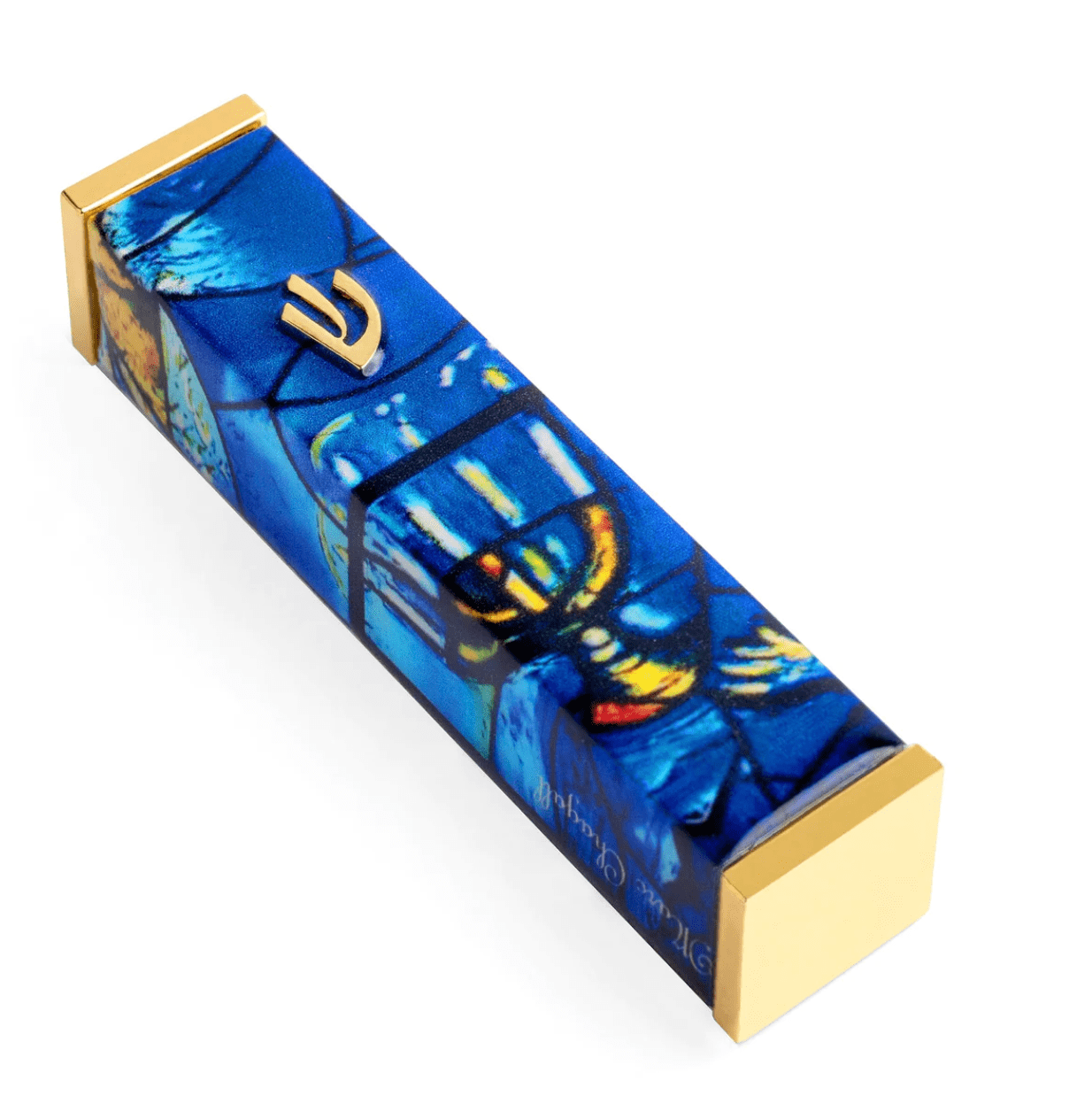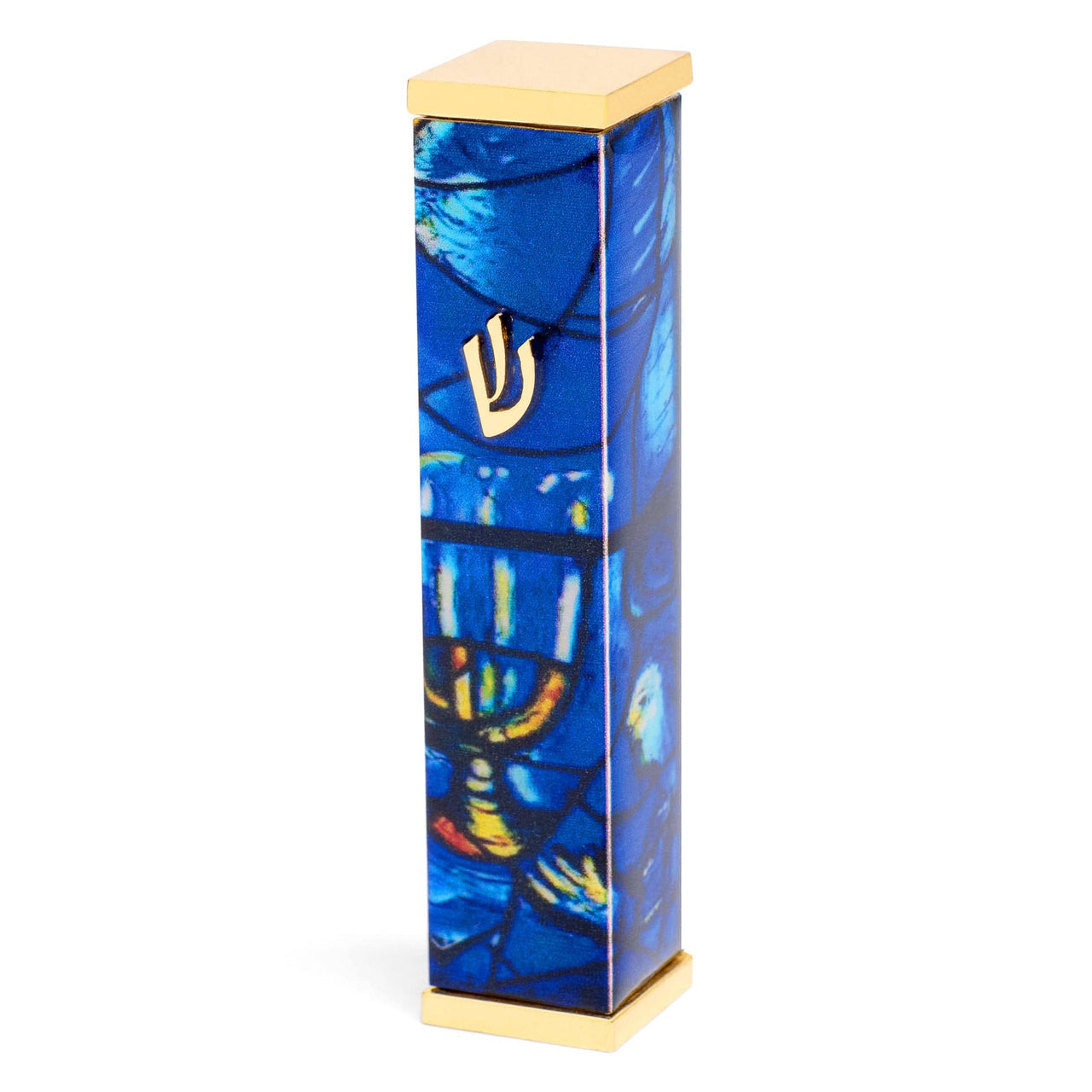Mezuzahs
A mezuzah is a tradition that blesses the home and reminds us daily of our Judaism. The case holds the important kosher mezuzah scroll, so pick something that reflects your style. We have over 200 mezuzah cases to choose from!
- Blue and Gold Marc Chagall Mezuzah Case

 BEST SELLERBlue and Gold Marc Chagall Mezuzah Case$54.00$54.00Unit price / per
BEST SELLERBlue and Gold Marc Chagall Mezuzah Case$54.00$54.00Unit price / per - Silver and Turquoise Pomegranate Mezuzah

 NEWSilver and Turquoise Pomegranate Mezuzah$54.00$54.00Unit price / per
NEWSilver and Turquoise Pomegranate Mezuzah$54.00$54.00Unit price / per
Related Collections
Mezuzah Cases For All Styles
ModernTribe carries mezuzah cases that fit your style. From modern marble to chic ceramic to fun rainbow acrylic, there is something for every style! We carry mezuzahs made in the USA and Israel too to support local artists.
Mezuzahs come in a variety of styles and designs, from traditional to modern, and can be made from materials such as wood, metal, glass, and even ceramic. Some mezuzahs feature intricate designs, while others are simple and elegant.
When shopping for a mezuzah, it is important to consider the style and material that best fits your personal taste and decor. Additionally, it is important to make sure that the mezuzah you choose has a properly inscribed scroll, or Klaf, which has the Shema prayer, as this is a crucial aspect of the mezuzah's religious significance.
Mezuzahs are not only a meaningful symbol of faith, but they also make for a beautiful addition to any home. They can be hung on the doorpost of (almost) every room in the house, not just the main entrance, symbolizing the home as a sacred space. Mezuzahs are also a great gift idea for Jewish friends, family, or newlyweds.
Frequently asked questions
What is a mezuzah?
What is the prayer in the mezuzah?
Why do we hang a mezuzah?
How do you hang a mezuzah?
- Choose the Right Location: Select the right doorpost on which to hang the mezuzah. It should be on the right-hand side as you enter the room, at about shoulder height for most people. The mezuzah should be affixed to the upper third of the doorpost, not too close to the top or bottom. When affixing a mezuzah, Ashkenazi Jews place it in a slanted position with the top pointed to the inside of the room. Sephardim place the mezuzah vertically.
- Recite the Blessing: Before affixing the mezuzah, say the appropriate blessing. The blessing is: "Baruch atah Adonai, Eloheinu Melech ha-olam, asher kid'shanu b'mitzvotav v'tzivanu likboa mezuzah." This blessing thanks God for sanctifying us with His commandments and commanding us to affix a mezuzah.
- Place the Mezuzah in Position: Hold the mezuzah in place on the doorpost and mark the top and bottom edges lightly with a pencil to indicate where to affix it.
- Make a Pilot Hole: For mezuzah cases installed with a nail, use a small nail or a drill to make a pilot hole at the marked spots. Be cautious to avoid damaging the doorpost or the mezuzah. Other mezuzah cases can be affixed with string or double-sided tape.
- Affix the Mezuzah: Insert the mezuzah's top edge into the pilot hole, and then press the bottom edge in place, ensuring it is straight. If using nails, insert them through the holes in the mezuzah case and into the pilot holes. If using adhesive, apply it to the back of the mezuzah case and press it firmly onto the doorpost.
- Close the Mezuzah Case: Once the mezuzah is affixed securely, gently close the mezuzah case to protect the parchment scroll.
- Say the Shema: As a custom, some people may recite the Shema or kiss their fingers and touch the mezuzah upon affixing it. Remember that the mezuzah should be checked periodically to ensure that the parchment inside remains intact and in good condition. If you are unsure about any aspect of the process, it's always best to seek guidance from a knowledgeable rabbi or Jewish authority.
Which rooms need a mezuzah?
- Front Door: The entrance to the home is the most important place to hang a mezuzah. It is traditionally placed on the right side as you enter. There are outdoor mezuzah cases that are made to withstand the elements.
- Living Room: The main living area of the home, where family and guests gather, is often considered a suitable location for a mezuzah.
- Kitchen: The kitchen is a central area where people spend much time, making it an appropriate place for a mezuzah.
- Bedrooms: Each bedroom where someone sleeps, including children's rooms, is an appropriate location for a mezuzah.
- Dining Room: If you have a separate dining room, you can place a mezuzah on its entrance.
- Study/Office: If you have a designated study or home office, it is customary to place a mezuzah on its doorpost.
- Any other significant rooms: If there are other rooms used regularly for dwelling or living, such as a den or family room, they may also be suitable for a mezuzah. It's important to note that bathrooms, closets, and small storage spaces are generally exempt from having a mezuzah, as they are not considered primary living areas.
Why Shop ModernTribe?

60K+ happy customers

Easy returns

Free shipping over $75






